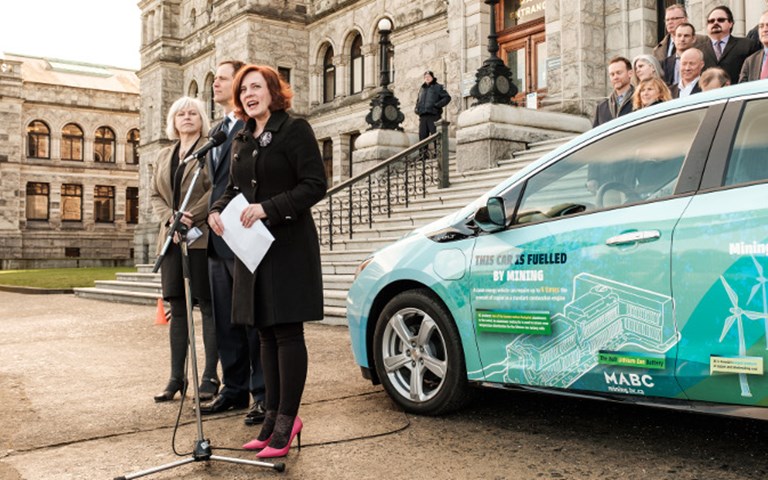B.C. mines ministers Michelle Mungall announced a provincial mining jobs task force and showed off an electric car that will tour the province, promoting the link between mining and clean energy initiatives. Courtesy of the Province of British Columbia
The British Columbia government has given a 12-member task force the job of finding ways to strengthen jobs in the province’s mining industry.
The B.C. Mining Jobs Task Force, commissioned by mines minister Michelle Mungall on Monday, will review current practices within the mining and exploration sector and make recommendations designed to keep the province competitive and sustainable. It will submit a report to the minister by November.
Job security in a changing industry will be a priority for the task force. “One of our goals with this review is to find ways to ensure mines in B.C. remain viable when commodity prices fluctuate, so that people can keep working and communities can thrive,” Mungall said in a press release.
“We need to make sure that our operations are cost competitive so we can continue to weather the commodity cycles that are just natural to the world,” said Bryan Cox, president and CEO of the Mining Association of British Columbia and one of the task force members. “The more efficient and competitive our operations are, the more we’re going to be able to sustain those jobs.”
Cox stressed that mining jobs are not just found on mine sites. “Legal, environmental and technology services are all housed in places like Vancouver, Victoria and Kelowna,” he said. “The opportunity to work in our industry is really a province-wide opportunity.”
Related: Global economic growth, Chinese manufacturing stability promise strong 2018 for commodities
The task force is comprised of representatives from the mining sector, Indigenous groups, municipal government, an environmental NGO and labour groups, among others. Association for Mineral Exploration president and CEO Edie Thome, Teck Resources head of government affairs Tom Syer and Michelle Laurie, a representative for United Steelworkers, are among the members.
Mungall said the task force will work with First Nations, industry members and communities to “develop recommendations on possible actions government could take to bring more certainty to the mining sector.”
One of those actions, Cox said, involves continuing to raise awareness of the mining sector’s importance to the province, like an electric car that will tour the province promoting the link between mined materials and clean energy initiatives.
“The contribution mining makes in British Columbia is really big right now,” Cox said. B.C.’s mining industry currently employs more than 30,000 people and adds more than $6 billion to the province’s GDP. More than 1,100 businesses across the province are suppliers and servicers to mining operations.



